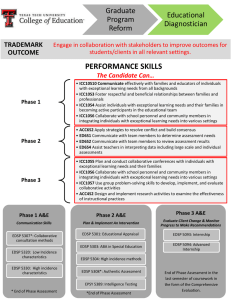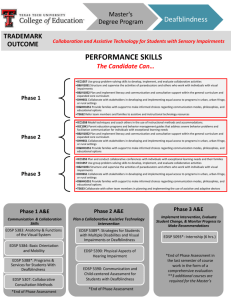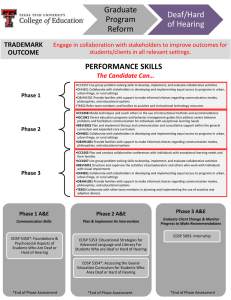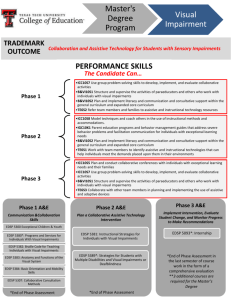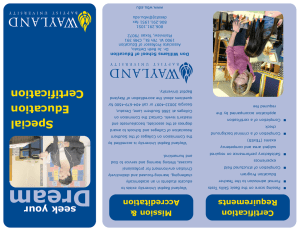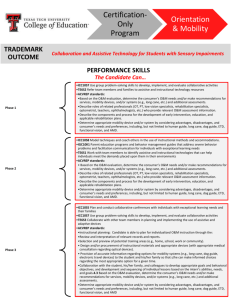Special Education Doctor of Philosophy (Ph.D.) Program Information Handbook
advertisement
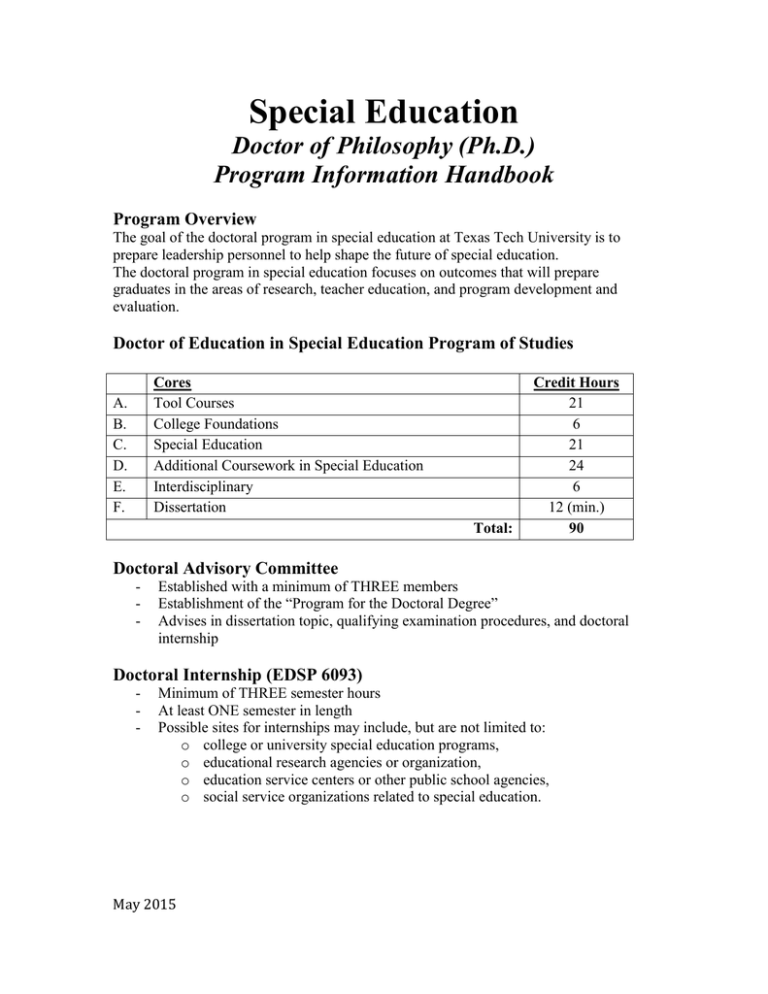
Special Education Doctor of Philosophy (Ph.D.) Program Information Handbook Program Overview The goal of the doctoral program in special education at Texas Tech University is to prepare leadership personnel to help shape the future of special education. The doctoral program in special education focuses on outcomes that will prepare graduates in the areas of research, teacher education, and program development and evaluation. Doctor of Education in Special Education Program of Studies Cores Tool Courses College Foundations Special Education Additional Coursework in Special Education Interdisciplinary Dissertation A. B. C. D. E. F. Total: Credit Hours 21 6 21 24 6 12 (min.) 90 Doctoral Advisory Committee - Established with a minimum of THREE members Establishment of the “Program for the Doctoral Degree” Advises in dissertation topic, qualifying examination procedures, and doctoral internship Doctoral Internship (EDSP 6093) - Minimum of THREE semester hours At least ONE semester in length Possible sites for internships may include, but are not limited to: o college or university special education programs, o educational research agencies or organization, o education service centers or other public school agencies, o social service organizations related to special education. May 2015 Qualifying Examination: Phase 3 Assessment - Completed during final semester of coursework Students will complete pilot study research that was proposed in the Phase 2 Assessment Student will prepare a manuscript or grant proposal based on the pilot study research Application for Candidacy A recommendation for candidacy is forwarded to the Graduate School by the chairperson of the advisory committee after the student completes the Phase 3 Assessment. The student will have four years to complete the dissertation after admission to candidacy by the Graduate Council. Dissertation and Oral Defense After successfully passing the doctoral qualifying examination, the student is eligible to present a formal proposal for the dissertation research to the doctoral advisory committee and other interested faculty. An oral defense of the dissertation is scheduled when the research has been completed and is ready for presentation. Residency Requirement - One year of residency is required (registration as a full-time student for two consecutive fall and spring semesters with at least 12 semester hours during each term; or - Three consecutive full summers of at least 9 weeks each while earning at least 9 semester hours of graduate credit during each summer; or - A full summer term of 12 weeks, earning 12 semester hours of graduate credit plus the completion of at least 12 semester hours of graduate credit during the adjacent spring or fall semester; or - For students holding half-time graduate assistantships or students involved for no more than half-time in other work closely related to the doctoral study, 9 semester hours in each of the long terms and at least 6 semester hours in the preceding or subsequent summer. Program Assessment Plan Phase 1 Performance Skills: The candidate can: o Demonstrate technical and persuasive writing skills o Conduct and write literature reviews o Identify hypothesis or research questions. Phase 1 End of Phase Assessment: o Students will conduct a comprehensive literature review in an area of May 2015 interest. o Occurs during EDSP 6301 OR EDSP 7000 if EDSP 6301 is out of sequence for student. Phase 2 Performance Skills o Demonstrate technical and persuasive writing skills o Review of literature o Identify hypothesis or research questions o Design research methodology o Complete IRB Phase 2 End of Phase Assessment: o Student will propose a pilot study o Student will complete and submit an IRB o Occurs during EDSP 7000 taken across 2 faculty committee members Phase 3 Performance Skills o Demonstrate technical and persuasive writing skills o Review of literature o Identify hypothesis or research questions o Design research methodology o Conduct Pilot Study o Analyze data and report results o Prepare request for funding/grant proposal OR disseminate research findings Phase 3 End of Phase Assessment: o Students will work under the direction of his/her doctoral committee o Students will complete pilot study research based on the needs of their internship site o Students will prepare a manuscript or a grant proposal o Phase 3 Assessment serves as the students Qualifying Exam Requirements for Ph.D. in Special Education Program of Studies Credit Hours A. Tool Courses (Research Methodology Core) – (may not be part of major) Required Courses: EPSY 5380 Introduction to Educational Statistics EPSY 5381 Intermediate Educational Statistics EPSY 5382 Qualitative Research in Education May 2015 21 EDSP 5345 Data Collection Methods and Single Subject Design Choose 3 of the following: EPSY 6349 Doctoral Seminar in Educational Psychology: Mixed Methods Research EPSY 6304 Qualitative Research Methods EPSY 6305 Qualitative Data Analysis in Education EDLL 6347, Analyzing, Designing, and Conducting Literacy Research EDCI 5380, Action Research (*Master’s Level Course) EDCI 5386, Constructivist Inquiry Methodologies in C&I EDCI 6382, Advanced Field Methods in Constructivist Inquiry EDHE 5341, Program Assessment and Evaluation in Higher Education EDHE 6310, Higher Education Doctoral Seminar EDHE 6311, Higher Education Research Seminar EPSY 5356, Decision-Making in Educational & Psychological Assessment EPSY 6001, Special Topics in Research Methods EPSY 6301, Structural Equation Modeling EPSY 6305, Archival Research Methods EPSY 6306, Longitudinal Data Analysis EPSY 6385, Causal Inference in Research EDSP 6305, Advanced Issues in the Experimental Analysis of Behavior EDSP 6308, The Nature and Practice of ABA Additional approved research courses will be added in Fall 2014. B. College Foundations Core Choose 2 of the following: EPSY 5310 Philosophy of Education EPSY 5314 History of Education EPSY 5323 Cultural Foundations of Education EPSY 5331 Human Development in Education EPSY 5332 Educational Psychology EDCI 5320 Curriculum Theory: Foundations C. Special Education Core Required Courses: EDSP 6301 Writing Grant Proposals in Special Education EDSP 6302 Program Evaluation in Special Education EDSP 6303 Contemporary Issues in Special Education EDSP 6304 Preparing Leadership Personnel for Special Populations EDLD 6341 Legal Issues with Special Populations EDSP 7000 Research in Special Education (3 hours) May 2015 6 21 EDSP 6093 Internship in Special Education (minimum of 3 hours) D. Additional Coursework in Special Education 24 The major includes a minimum of 24 additional hours of coursework in special education. Courses may be taken in conjunction with a certification program. E. Interdisciplinary Core 6 This coursework is taken outside special education in a related area, such as educational psychology, psychology, instructional technology, curriculum, human development, etc. It is intended to complement the doctoral student’s specialization within special education. F. Dissertation – minimum of 12 hours 12 TOTAL HOURS= 90 SSII 2015 EDSP 6302 Fall 2015 EDSP 6301 Spring 2016 EDSP 6303 Summer 2016 EDLD 6341 Fall 2016 EDSP 6304 Spring 2017 EDSP 6302 Summer 2017 EDSP 6301 Fall 2017 EDSP 6303 Doctoral Course Rotation Through Fall 2017 Doctoral Special Education Classes EDSP 6301 Writing Grant Proposals in Special Education EDSP 6302 Program Evaluation in Special Education EDSP 6303 Contemporary Issues in Special Education EDSP 6304 Preparing Leadership Personnel for Special Populations EDLD 6341 Legal Issues with Special Populations EDSP 7000 Research in Special Education (3 hours) EDSP 6093 Internship in Special Education (minimum of 3 hours) PhD End of Phase Assessments Phase 1 Students will conduct a comprehensive literature review in area of interest. o Connected to EDSP 6301 or an additional EDSP 7000 if EDSP 6301 is out of sequence for any doctoral student. Phase 2 May 2015 Students will propose pilot study and complete IRB. o Connected to EDSP 7000 with 3 credit hours across at least 2 faculty members. Phase 3 Students will complete pilot study research and prepare a manuscript or grant proposal. o Under the direction of Doctoral Student’s Committee. o Serves as the student’s QUALIFYING EXAM. Additional Notes: *PhD students should work closely with their doctoral committee advisor to arrange for the End of Phase Assessments. **PhD students are not required to UPLOAD End of Phase Assessments to the TOMS Blackboard site. They should work with their advisor (or course instructor if Phase 1 is completed during EDSP 6301). ***The PhD student and his/her advisor will determine student readiness to complete the End of Phase Assessments. Scope and Sequence for Ph.D. in Special Education PhD Trademark Outcome: Ph.D. graduates of the Special Education program will demonstrate competency in a variety of innovative, pragmatic field-based research endeavors resulting in high-quality dissemination activities including manuscript preparation, conference presentations, and grant proposal development. Phase 1: Demonstrate high quality research skills: *Technical writing *Research questions *Review literature *Study design Phase 2: Propose pilot study and complete IRB *Propose Pilot Study *Create viable IRB proposal Phase 3: Complete a Pilot Study based on the needs of the internship site and complete a grant proposal or publishable manuscript May 2015 A&Es EPSY 5380 A&Es EPSY 5381 A&Es EPSY 5382 A&Es EDSP 5345 *EDSP 7000 EDSP 6302 EDSP 6304 EDLD 6341 *Phase 2 Assessment EDSP 6093 A&Es EDSP 6303 A&Es *EDSP 6301 *Phase 1 Assessment Assessment P1 Assessment: Conduct a comprehensive literature review in an area of interest during EDP 6301 or EDSP 7000 if EDSP 6301 is out of sequence. P2 Assessment: Propose a pilot study and complete an IRB in EDSP 7000 under the direction of 2 faculty members P3 Assessment: Complete pilot study research (using internship site) and prepare a manuscript or grant proposal. P3 Assessment serves as student’s Qualifying Exam. Appendix A Graduate Program Reform: College of Education Goal: To reform graduate education at Texas Tech University to graduate the measurably best educators. The trademark outcome for each graduate program represents a decisive skill that sets our graduates apart from others in the field. Performance-ready upon graduate In-depth knowledge and practical implementation experience throughout the program Students don’t just learn about it, they practice it until perfecting it with faculty guidance Trademark Outcomes (TO): Specific competency-based skills demonstrated through performance on multiple occasions throughout the student’s graduate education. Each graduate program has selected a trademark outcome based on three factors: Key findings identified by employers Critical standards and objectives recognized by professional organizations Valuable results pinpointed through faculty expertise Data Available: Each graduate student is tracked through course-related Apply and Evaluate Activities and Phase 1, Phase 2, and Phase 3 End of Phase Assessments. The graduate curriculum in the College of Education is divided into three interrelated phases that assess mastery of the TO. Phases: Phase 1 (P1) consists of the acquisition of knowledge. Phase 2 (P2) requires that you apply the knowledge and skills you have learned. Phase 3 (P3) entails designing, implementing, and evaluating the information in real life settings. Apply and Evaluate (A&E) Projects/Activities Each course has an A&E A&Es are specific to the content of the course but assess progress towards mastery of the TO Progress on individual A&Es provides both faculty and students with opportunities for both remediation and enrichment Feedback on A&Es is immediate and within the framework of the course Rubrics are completed and made available to students P1-P3 End of Phase Assessment P1 End of Phase Assessment- Reflects mastery of all Phase 1 knowledge and skills P21 End of Phase Assessment- Requires that the student actually does something in a scaffolded project to demonstrate mastery P3 End of Phase Assessment- Signals mastery of the Trademark Outcome through performance-based demonstration of what the student has learned May 2015 Rubrics for A&Es and P1-P3 End of Phase Assessments Based on standards of professional practice Made available prior to assessment and after completion of activities Rubrics and scores are maintained in the College of Education database How Does the Reform Change Practice? Performance-based mastery ensures that our graduates will contribute with real-world solutions in their jobs. Graduate education is based on standards of the profession and expectations of employers. Appendix B: PhD Data Sheet May 2015 Graduate Program Reform TRADEMARK OUTCOME Ph.D in Special Education Demonstrate competency in a variety of innovative, pragmatic field-based research endeavors resulting in high-quality dissemination activities including manuscript preparation, conference presentations, and grant proposal development. PERFORMANCE SKILLS The Candidate Can… Phase 1 • Demonstrate T technical and persuasive writing skills • Review of literature T • Identify hypothesis or research questions Phase 2 • Demonstrate technical and persuasive writing skills • Review of literature • Design research methodology • Identify hypothesis or research questions • Design research methodology Phase 3 • Demonstrate technical and persuasive writing skills • Review of literature • Identify hypothesis or research questions • Design research methodology • Conduct pilot study • Analyze data and report results • Prepare request for funding/grant proposal • Disseminate research findings Phase 1 A&E Phase 2 A&E Communication Skills Plan & Implement An Intervention EPSY 5380: Introduction to Educational Statistics (A&E possibly thru EPSY) EPSY 5381: Intermediate Educational Statistics (A&E possibly thru EPSY) EDSP 6304: Preparing Leadership Personnel EPSY 5382: Qualitative Research in Education (A&E possibly thru EPSY) EDSP 5345: Single Subject Design EDLD 6341: Legal Issues with Special Populations EDSP 6301*: Leadership with Special Populations EDSP 7000*: Research EDSP 6303: Contemporary May 2015Issues in Special Education Students will conduct a comprehensive literature review in area of interest. *End of Phase Assessment. EDSP 7000 if out of sequence. Students will propose pilot study and complete IRB. *End of Phase Assessment. Requires 3 credit hours across at least 2 faculty members. Phase 3 A&E Evaluate Client Change & Monitor Progress to Make Recommendations EDSP 6093: Internship Students will complete pilot study research and prepare a manuscript or a grant proposal. Under the direction of Doctoral Student’s Committee. Serves as the student’s Qualifying Exam
